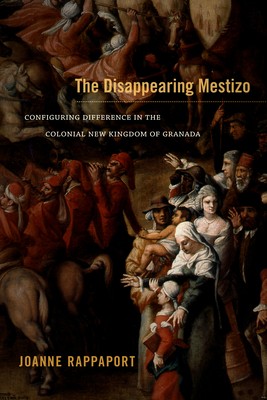
- We will send in 10–14 business days.
- Author: Joanne Rappaport
- Publisher: Duke University Press
- ISBN-10: 0822356295
- ISBN-13: 9780822356295
- Format: 15.8 x 23.4 x 2.5 cm, kieti viršeliai
- Language: English
- SAVE -10% with code: EXTRA
Reviews
Description
Much of the scholarship on difference in colonial Spanish America has been based on the "racial" categorizations of indigeneity, Africanness, and the eighteenth-century Mexican castas system. Adopting an alternative approach to the question of difference, Joanne Rappaport examines what it meant to be mestizo (of mixed parentage) in the early colonial era. She draws on lively vignettes culled from the sixteenth- and seventeenth-century archives of the New Kingdom of Granada (modern-day Colombia) to show that individuals classified as "mixed" were not members of coherent sociological groups. Rather, they slipped in and out of the mestizo category. Sometimes they were identified as mestizos, sometimes as Indians or Spaniards. In other instances, they identified themselves by attributes such as their status, the language that they spoke, or the place where they lived. The Disappearing Mestizo suggests that processes of identification in early colonial Spanish America were fluid and rooted in an epistemology entirely distinct from modern racial discourses.
EXTRA 10 % discount with code: EXTRA
The promotion ends in 21d.22:22:03
The discount code is valid when purchasing from 10 €. Discounts do not stack.
- Author: Joanne Rappaport
- Publisher: Duke University Press
- ISBN-10: 0822356295
- ISBN-13: 9780822356295
- Format: 15.8 x 23.4 x 2.5 cm, kieti viršeliai
- Language: English English
Much of the scholarship on difference in colonial Spanish America has been based on the "racial" categorizations of indigeneity, Africanness, and the eighteenth-century Mexican castas system. Adopting an alternative approach to the question of difference, Joanne Rappaport examines what it meant to be mestizo (of mixed parentage) in the early colonial era. She draws on lively vignettes culled from the sixteenth- and seventeenth-century archives of the New Kingdom of Granada (modern-day Colombia) to show that individuals classified as "mixed" were not members of coherent sociological groups. Rather, they slipped in and out of the mestizo category. Sometimes they were identified as mestizos, sometimes as Indians or Spaniards. In other instances, they identified themselves by attributes such as their status, the language that they spoke, or the place where they lived. The Disappearing Mestizo suggests that processes of identification in early colonial Spanish America were fluid and rooted in an epistemology entirely distinct from modern racial discourses.


Reviews